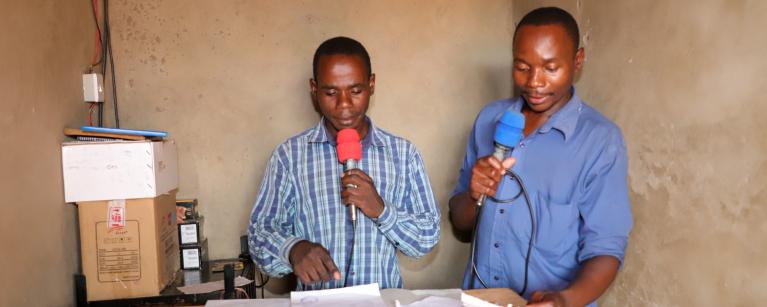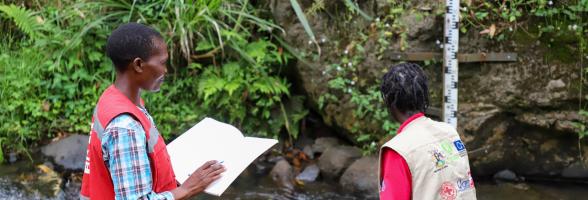About 10 kilometers away from the busy and bustle of Mbale town is the Bungokho sub-county. This has 68 villages, among them Nambiti village. In a one-room building, a small community radio is the heartbeat of the Nambiti community. Nambiti Community Radio is not your typical everyday frequency radio. One solar panel is connected to it, delivering power to one battery that powers the radio. Three megaphones are hoisted outside on a tall metallic pole. The waves through the megaphones travel over 300 meters within the village to whoever can hear them. You do not need a radio to tune in. The radio, run by volunteer presenters, is a perfect symbol of passion, commitment, and effort to save lives.
At the helm of the Nambiti community radio is Sirengo Henry, a charismatic and warm-hearted community radio presenter. Henry stands behind a wooden table with a red microphone in hand. He makes some announcements in his native Lumasaaba language, used across the Mt. Elgon Region in Eastern Uganda.
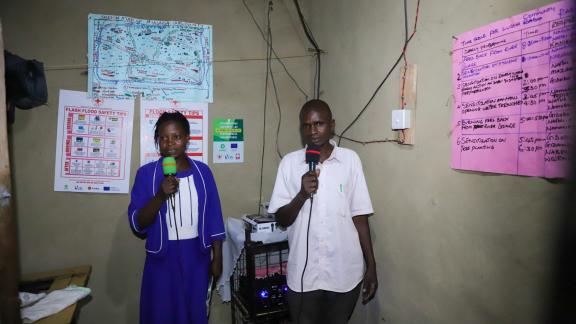
Community radio announcers sending out information in one of the radio stations established under the Strengthening Community-led and locally owned Disaster Preparedness Actions. Photo by Ivan Rackara | Oxfam in Uganda
Henry has not always been a radio presenter. He is a local builder who also has a passion for public speaking and community engagement. If not at a building site, Henry would be at a community gathering where he was the preferred choice of an MC/announcer, also doubling as a comedian.
On 8th February 2023, the Red Cross, working under a consortium of partners including Oxfam, Catholic Relief Services, and Caritas Tororo, installed this community radio, among other radios. Little known to Henry, this was to be his new everyday station along with his colleague Gerald. They were both nominated by the community, given their passion for public speaking and great charisma.
Henry couldn’t be any happier! His dream of one day becoming a radio presenter had become a possibility. The radio opens in segments starting at 5 am – 8 am and 4:30 pm – 10 pm. This allows Henry and his colleague time to attend to their homes and construction work. The presenters are always on standby in case of an emergency.
According to a Red Cross volunteer, Mukhwana Francis Yona, these community radios aim to pass on early warning information to the community. Mt Elgon region is one of the regions in Uganda that is prone to disasters such as floods and mudslides that negatively affect people’s lives and livelihoods. European Union Humanitarian Aid (ECHO), therefore, provided funding through Oxfam to work in consortium with the Red Cross, Catholic Relief Services, and Caritas Tororo to implement a disaster preparedness project. This is improving the early warning and response capacities of some districts in these regions. These districts include Mbale, Bududa, Namisindwa, Butalejja, and Sironko.
The project has strengthened the capacity of the District Disaster Management Committees and Sub County Disaster Management Committees, among other efforts. With this capacity, three of the districts have developed their contingency plans, which have been approved by the Office of the Prime Minister. The project has trained Village Disaster Management Committees and deployed over 50 Red Cross Action Teams (RCATS) and CRS volunteers to disseminate targeted early warning information with advisories at the village level, reaching a population of over 28,000 community members.
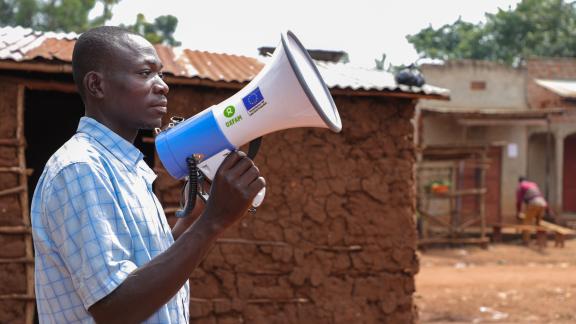
Alex Mutali, a community announcer in Nambiti village sends out announcements via a megaphone. These megaphones which were procured under the project support dissemination of early warning information and advisory in the event of disasters. Photo by Ivan Rackara | Oxfam in Uganda
The project has further installed 13 graduated river-level gauges with the Ministry of Water and Environment to help with monitoring water levels in the rivers and 20 community radios in strategic hotspot locations to facilitate early warning information dissemination. This has increased community preparedness and readiness to respond to disasters.
Nambiti village, like many villages in the sub-county, has a history of flooding. According to Sam Kibosi, the Nambiti village chairperson, the major issue arises from the Nambale River – flowing from the mountains, joined by the other rivers and streams.
“When it rains heavily, the river floods and causes problems in this village and others. Some of the areas are blocked, and water cannot flow well. In August 2022, floods left many houses broken down. Food crops washed away, and people miserable”
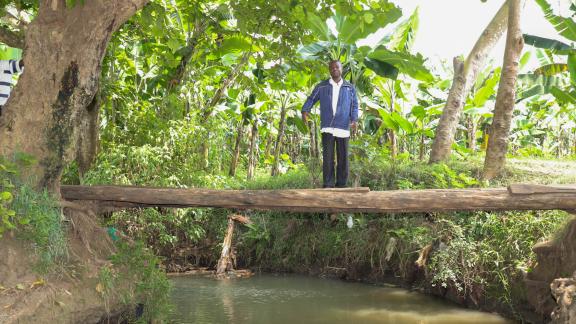
Sam Kibosi is the Chairperson LC1 of Nambiti B village in Bungokho sub-county, Mbale District. He explains the magnitude of how floods affected this river and the two villages, it connects. Whenever the river is flooded, the communities receive alerts and warnings from the community radio not to cross. Photo by Ivan Rackara | Oxfam in Uganda
Initiatives like community radios were received with great optimism by the community. They use the radios to pass on early warning information about the possibility of flooding. This information comes from the team doing the river gauge readings, which is another initiative of the project. Once Henry and Gerald receive the information, they pass it on repeatedly to the community through the radio. They warn the community about rising water levels and tell them what to do. The Village Disaster Committee also uses the radio to sensitize the community about mitigation measures. These include digging trenches, contours, and planting trees. They also use the radios to pass on other community announcements, such as lost animals and health information. For example, they share details about taking children for immunization.
To ensure the efficient running of the radio, there is a 3-person Community Management Committee that oversees the operations. They ensure that the information is within the agreed parameters. For example, no politics or campaigns are allowed.
Besides the committee, there is a strong power of the community that ensures that the radio station continues operating given its benefits. For example, one of the general conditions for installing any of the community radios was the community having a permanent, secure structure to house the radio. Nambiti did not have this. Kibosi Sam, the village Chairperson, temporarily donated one of his buildings where the radio is currently established. He initially rented out the building to businesspeople at a fee of 40,000Ugx per month. He had to forfeit 40,000Ugx as monthly rent he was getting from the building, but he was happy to give up the room.
“I knew the benefit of the radio was to the community and saving us from these disasters, so I did this for the love of my community.”, People can easily access this radio; they pass on announcements freely or at the smallest fee, but importantly, we are able to keep communities safe. The radio is complemented with door-to-door messages to families in high-risk areas”
Henry also boasts that the radio allows for people to call in free of charge and pass their information from wherever they are. The radio has a sound pin connected to a phone, which has a toll-free line where the community can call in, and they will be heard on the megaphones as they call.
Some of these advantages of the radio are what Henry and the committee are using to market the radio. “For sustainability of the radio, we introduced business advertising at a modest fee. For these, they charge between 1,000Ugx and 10,000Ugx,” said Henry.
The committee vets the adverts, handles the money, and collectively decides on what to use it for. In the past, they collected 90,000Ugx, which was used to buy metallic poles to hoist the megaphones higher.
They hope to get more business announcements to address some of the prevailing challenges. The batteries run out during the rainy season, and the presenters currently use their personal phones, where they put the toll-free line to receive calls from the community – they hope to get a phone dedicated to the radio.
Henry has big dreams for himself and the radio. He hopes that they can have a bigger space to separate the radio from the reception for minimal interruptions. On a personal note, Henry would like to advance his radio career. He also hopes to nurture a young breed of presenters. Starting with one of his two children, who loves to watch his father speak on the microphone.
Asked what keeps him motivated and committed. Henry says he is happy when speaking to people. “The radio is giving me a great learning experience for a possible future radio career. Importantly, I know what I do contributes to developing our community and even saving lives!
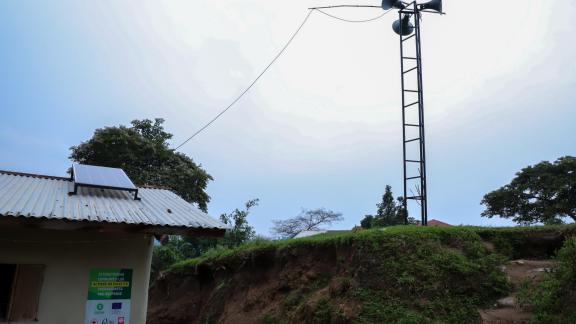
A photo of one of the community radios established under the Strengthening Community-led and locally owned Disaster Preparedness Actions project that serves the community with information on disaster preparedness and response. Photo by Ivan Rackara | Oxfam in Uganda
The impact of these community radios is felt far beyond just Nambiti village. The project has 20 similar radios across 10 sub-counties in the Mbale, Namisindwa, Bududa, Sironko, and Butaleja districts. In each of these radios, you find heart-warming stories of unity, passion, and dedication to the community, with presenters such as Henry at the forefront.
The local leaders in each of these districts and sub-counties strongly agree that these community radios play a crucial role. They serve as effective communication channels within local communities for early warning and action for disaster risk management.
“These radios are providing timely and very localized information that the people trust. We are also embracing them to pass out other development information like the Parish Development Model, which is a government economic program working directly with the most vulnerable communities through their parishes. Hopefully, we can also play a crucial part in their sustainability”
Community radios like Nambiti are not just radio stations saving lives but a testament to the power of the community and the unwavering dedication of passionate presenters like Henry.
By Dorah Ntunga G - Media and Communications Coordinator (Oxfam in Uganda)
